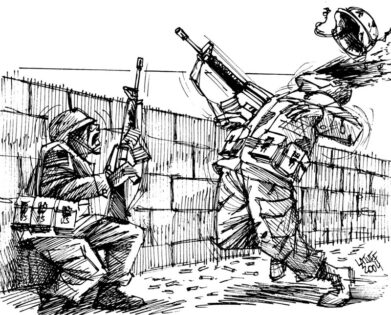Howard Zinn:
Tag: iraq
Revolt spreads across Iraq
Simon Assaf reports:
A mass revolt has broken out across Iraq against attempts by the US and its allies to crush the Shia Muslim resistance to the occupation.
This began when Iraqi troops backed by US forces laid siege to Basra earlier this week. British troops were driven out of Basra late last year.
The Iraqi government claims that the current violence is a fight between different Shia Muslim factions, and an attempt by the government to cleanse Basra of “criminal elements”.
It is nothing of the sort. The occupation is attempting to provoke Shia Muslim areas into a “showdown” that has been a central aim of the US troop “surge”.
The aim of the siege is to crush the nationalist movement headed by rebel Shia cleric Muqtada al-Sadr.
Sadr’s Mehdi Army is a key element in the popular resistance to the occupation.
The Mehdi Army fought alongside Sunni Muslim insurgents during the first uprising against the occupation in 2004.
Sadr recently launched the Reform and Reconciliation Project with sections of the Sunni resistance.
According to reports, Iraqi troops stormed Basra’s main market on Tuesday – the first day of the assault. Soldiers set fire to the stores of food, cut electricity and water supplies. They are attempting to drive out the 2.5 million civilians trapped inside the city. There are reports that US troops have now taken over from Iraqi soldiers after they failed to capture the city.
In a message relayed to Socialist Worker from Hassan Jumaa, the leader of Iraq’s main oil workers’ union, said that Basra rose in revolt.
“The assault began with intense shelling and fire from all sorts of weapons,” the message states.
“The army that is laying siege to Basra is so large that it stretches from the Dhi Qar province all the way to the city.
“The heroic neighborhood of Hayania is preventing the puppet Iraqi army from entering the city. There is great popular discontent. Non stop phone contacts since Tuesday shows this very clearly.”
Hayania is one of the poorest area of Basra and a stronghold of the Mehdi Army.
Jumaa said, “The [poor] neighborhoods of Khamsa Meel and Qiblas are steadfast. Fighting is going on where I live.”
The attack on Basra has sparked a mass revolt across the Shia majority areas of Iraq.
UPDATE: A good posting by Lenin.
‘If anybody came into my house, in the middle of the night and turned it upside down like we do in their houses, I would react just the same way. And they would call me a terrorist too’
Camilla Lai kindly translated her posting about an encounter with a US soldier serving in Iraq:
You land in the heart of AmericaLand and suddenly you realize that we are at war. In fact, them, the Americans, are at war but we, Westerners just like them, appear indistinguishable, in cause and effect.
“This war risks to become longer then World War II”, I was reading in The New York Times while waiting to board my flight. Atlanta airport is loaded with marines destined to Iraq. On their arm they carry, in Arabic, the name of their duty station. Young recruits who in order to pay their school fees are ready to die for an ideal which they don’t even believe in.
“If anybody came into my house, in the middle of the night and turned it upside down like we do in their houses, I would react just the same way. And they would call me a terrorist too”. John is wearing civilian clothes, but its rhythmic and fast trod leaves no doubt: he is in the Army (“Marines are sissy”, he claims).
Between strangers who will never meet again sincerity blooms. So he tells me that he came back, to Tennessee, because his step-father had died, of cancer. “We knew it was coming”, he says, and his rhythmic step does not skip a beat. Because at 21 (22, maximum 23) years of age, John is used to horror. Because he himself created horror, every single one of the days he served in Iraq. And from the height of the studies he hasn’t yet done, he says the same exact things that so many intellectuals write: “Saddam kept all those diversities united. No one dared to rebel. Bush opened the gate to hell”.
I stumble, I suck my cigarette as if I were clinging to a sentence, a desperate sequitur. Nothing comes.
When we board (he is flying through Rome to Dubai and then Iraq), John mumbles, almost to himself: “Forget about Vietnam. They tell us to fight the enemy. But we do not know who it is, the enemy. They made us walk though that door and now we are there, in hell, everyday”.
